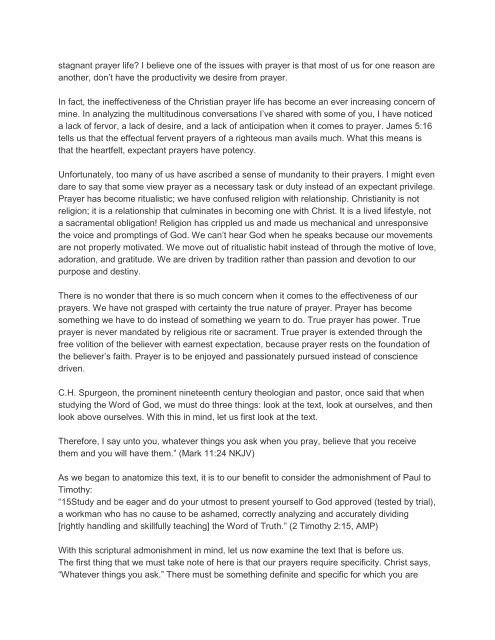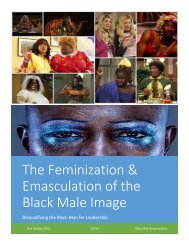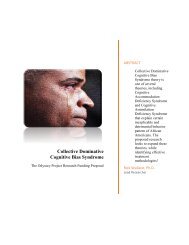The Potency of Prayer
Dr. Rick Wallace engages the powerful and efficacious tool of prayer when it is properly executed through the conduit of faith and the understanding of God's will.
Dr. Rick Wallace engages the powerful and efficacious tool of prayer when it is properly executed through the conduit of faith and the understanding of God's will.
Create successful ePaper yourself
Turn your PDF publications into a flip-book with our unique Google optimized e-Paper software.
stagnant prayer life? I believe one <strong>of</strong> the issues with prayer is that most <strong>of</strong> us for one reason are<br />
another, don’t have the productivity we desire from prayer.<br />
In fact, the ineffectiveness <strong>of</strong> the Christian prayer life has become an ever increasing concern <strong>of</strong><br />
mine. In analyzing the multitudinous conversations I’ve shared with some <strong>of</strong> you, I have noticed<br />
a lack <strong>of</strong> fervor, a lack <strong>of</strong> desire, and a lack <strong>of</strong> anticipation when it comes to prayer. James 5:16<br />
tells us that the effectual fervent prayers <strong>of</strong> a righteous man avails much. What this means is<br />
that the heartfelt, expectant prayers have potency.<br />
Unfortunately, too many <strong>of</strong> us have ascribed a sense <strong>of</strong> mundanity to their prayers. I might even<br />
dare to say that some view prayer as a necessary task or duty instead <strong>of</strong> an expectant privilege.<br />
<strong>Prayer</strong> has become ritualistic; we have confused religion with relationship. Christianity is not<br />
religion; it is a relationship that culminates in becoming one with Christ. It is a lived lifestyle, not<br />
a sacramental obligation! Religion has crippled us and made us mechanical and unresponsive<br />
the voice and promptings <strong>of</strong> God. We can’t hear God when he speaks because our movements<br />
are not properly motivated. We move out <strong>of</strong> ritualistic habit instead <strong>of</strong> through the motive <strong>of</strong> love,<br />
adoration, and gratitude. We are driven by tradition rather than passion and devotion to our<br />
purpose and destiny.<br />
<strong>The</strong>re is no wonder that there is so much concern when it comes to the effectiveness <strong>of</strong> our<br />
prayers. We have not grasped with certainty the true nature <strong>of</strong> prayer. <strong>Prayer</strong> has become<br />
something we have to do instead <strong>of</strong> something we yearn to do. True prayer has power. True<br />
prayer is never mandated by religious rite or sacrament. True prayer is extended through the<br />
free volition <strong>of</strong> the believer with earnest expectation, because prayer rests on the foundation <strong>of</strong><br />
the believer’s faith. <strong>Prayer</strong> is to be enjoyed and passionately pursued instead <strong>of</strong> conscience<br />
driven.<br />
C.H. Spurgeon, the prominent nineteenth century theologian and pastor, once said that when<br />
studying the Word <strong>of</strong> God, we must do three things: look at the text, look at ourselves, and then<br />
look above ourselves. With this in mind, let us first look at the text.<br />
<strong>The</strong>refore, I say unto you, whatever things you ask when you pray, believe that you receive<br />
them and you will have them.” (Mark 11:24 NKJV)<br />
As we began to anatomize this text, it is to our benefit to consider the admonishment <strong>of</strong> Paul to<br />
Timothy:<br />
“15Study and be eager and do your utmost to present yourself to God approved (tested by trial),<br />
a workman who has no cause to be ashamed, correctly analyzing and accurately dividing<br />
[rightly handling and skillfully teaching] the Word <strong>of</strong> Truth.” (2 Timothy 2:15, AMP)<br />
With this scriptural admonishment in mind, let us now examine the text that is before us.<br />
<strong>The</strong> first thing that we must take note <strong>of</strong> here is that our prayers require specificity. Christ says,<br />
“Whatever things you ask.” <strong>The</strong>re must be something definite and specific for which you are


















